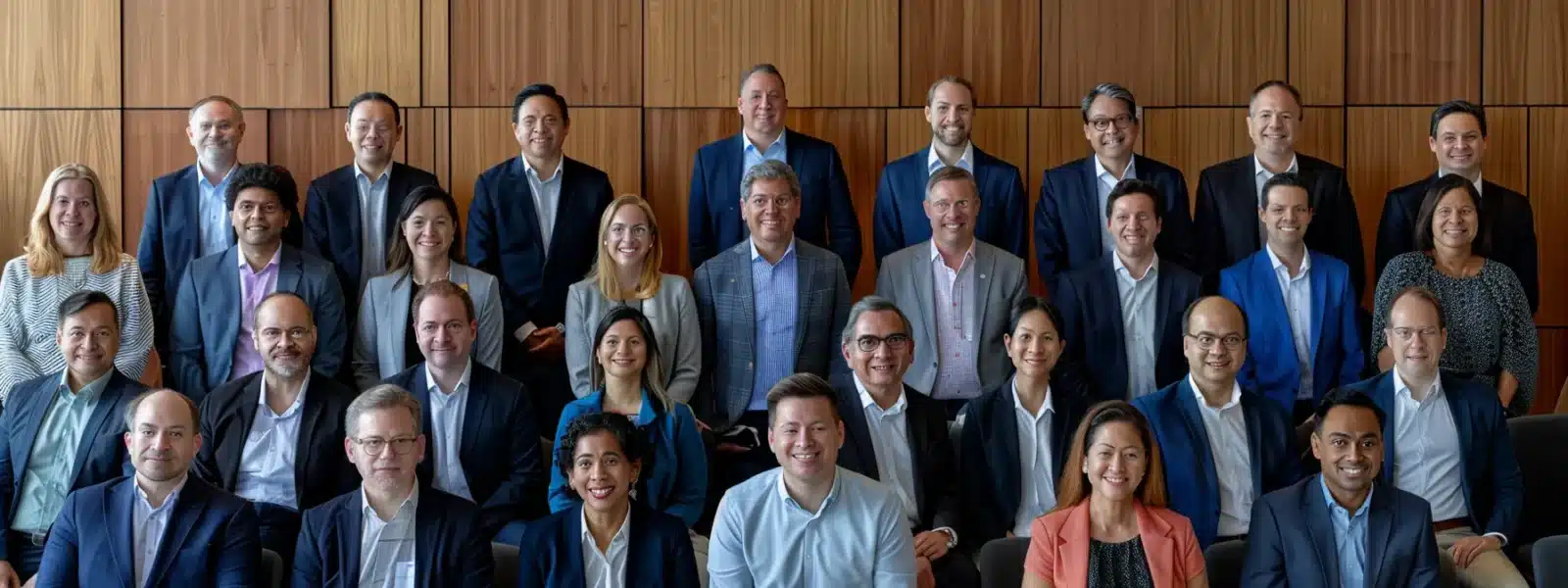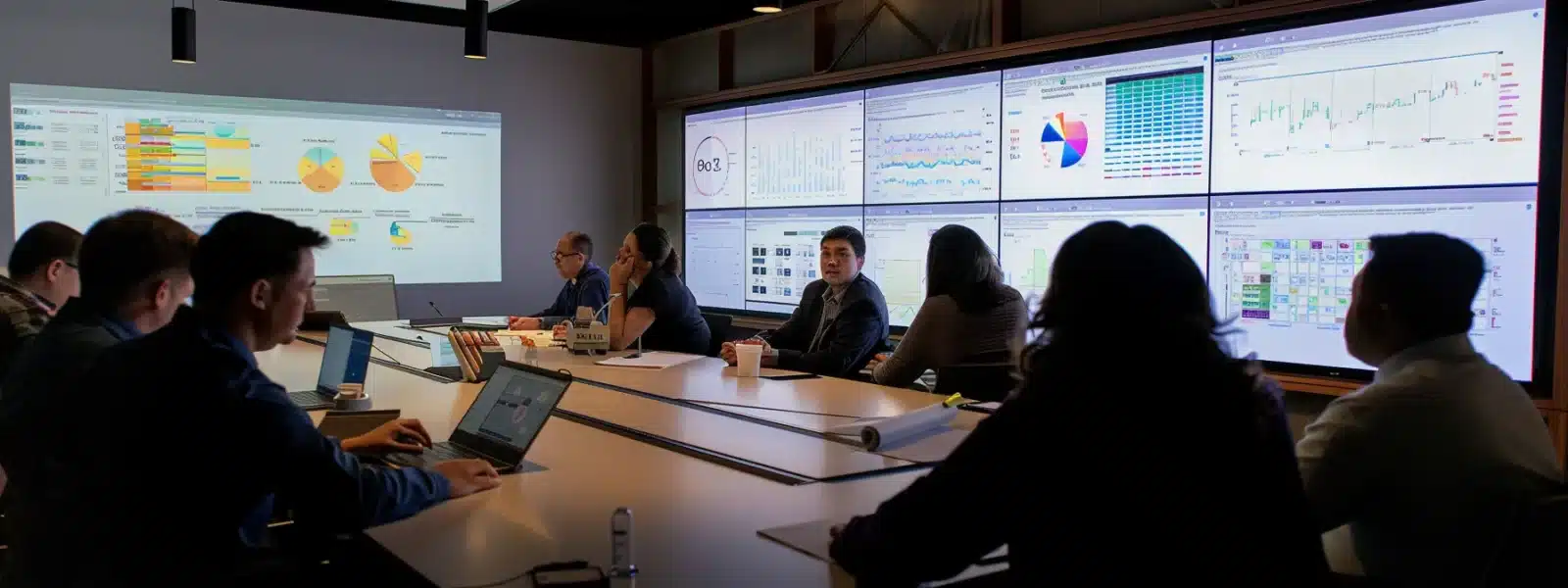Navigating the complexities of CMMC compliance can be challenging for many businesses. With the right CMMC consulting services, organizations can effectively address their compliance needs, conduct thorough gap analyses, and implement robust risk management strategies. This guide will explore how to identify your specific compliance requirements, key factors to consider when selecting a consulting service, and the benefits of partnering with a managed services provider. By understanding these elements, businesses can streamline their compliance efforts and secure contracts with confidence.
Key Takeaways
- understanding cmmc levels is crucial for effective cybersecurity risk management
- non-compliance can lead to loss of contracts and damage to reputation
- regular audits help identify gaps and improve cybersecurity practices
- engaging cmmc consultants provides expert guidance for achieving compliance
- achieving cmmc compliance enhances trust and competitive advantage in government contracting
Understanding CMMC and Its Importance for Your Business

CMMC, or Cybersecurity Maturity Model Certification, is essential for businesses, particularly defense contractors, as it establishes a framework for managing cybersecurity risks. Understanding the levels of CMMC compliance is crucial for effective risk assessment and supply chain risk management. Non-compliance can lead to significant consequences, impacting business operations and reputation. This section will explore these key aspects in detail.
What Is CMMC and Why It Matters
CMMC, or Cybersecurity Maturity Model Certification, is a framework designed to enhance cybersecurity practices among businesses, particularly those in the defense sector. It establishes a structured approach to managing cybersecurity risks, emphasizing the importance of regulatory compliance. By adhering to CMMC standards, organizations can improve their authentication processes and reduce the complexity of their cybersecurity measures, ultimately safeguarding sensitive information.
The significance of CMMC extends beyond compliance; it plays a critical role in supply chain risk management. Businesses that engage with government contracts must demonstrate their commitment to cybersecurity, as non-compliance can lead to severe repercussions, including loss of contracts and damage to reputation. Implementing CMMC not only helps organizations meet regulatory requirements but also fosters trust among partners and clients, ensuring a more secure supply chain.
Moreover, CMMC encourages the use of analytics to assess and enhance cybersecurity practices. By leveraging data-driven insights, organizations can identify vulnerabilities and implement targeted strategies to mitigate risks. This proactive approach not only aids in achieving compliance but also positions businesses to respond effectively to evolving cybersecurity threats, ultimately contributing to long-term operational resilience.
The Impact of CMMC on Defense Contractors
The implementation of the Cybersecurity Maturity Model Certification (CMMC) has a profound impact on defense contractors, as it establishes stringent requirements for access control and overall cybersecurity practices. Understanding these requirements is essential for contractors aiming to secure government contracts. By adhering to CMMC standards, defense contractors can enhance their security posture, ensuring that sensitive information is adequately protected against potential threats.
Moreover, the CMMC framework necessitates regular audits to assess compliance with its various levels. These audits not only help identify gaps in cybersecurity practices but also provide a roadmap for improvement. For defense contractors, this means a proactive approach to managing cybersecurity risks, which is crucial in an environment where threats are constantly evolving.
Ultimately, the CMMC serves as a critical tool for defense contractors to demonstrate their commitment to cybersecurity. By achieving compliance, these organizations can build trust with clients and partners, ensuring a more secure supply chain. This commitment not only mitigates risks but also positions contractors favorably in a competitive landscape, where adherence to cybersecurity standards is increasingly becoming a prerequisite for doing business.
Levels of CMMC Compliance Explained
The Cybersecurity Maturity Model Certification (CMMC) consists of five distinct levels, each designed to enhance an organization‘s cybersecurity posture. These levels range from basic cyber hygiene practices at Level 1 to advanced security measures at Level 5. Understanding these levels is crucial for businesses, especially those handling Controlled Unclassified Information (CUI), as compliance with the CMMC framework is increasingly tied to the Federal Acquisition Regulation (FAR).
Each level of CMMC builds upon the previous one, incorporating more stringent requirements and controls. For instance, Level 1 focuses on basic safeguarding measures, while Level 3 introduces more comprehensive practices aligned with the National Institute of Standards and Technology (NIST) guidelines. Organizations seeking certification must demonstrate knowledge of these requirements and implement the necessary controls to protect sensitive information effectively.
Achieving CMMC certification not only ensures compliance with federal regulations but also enhances an organization‘s reputation in the marketplace. By understanding the levels of compliance, businesses can identify their current cybersecurity capabilities and develop a roadmap for improvement. This proactive approach not only mitigates risks but also positions organizations favorably when competing for government contracts.
| CMMC Level | Description | Key Focus Areas |
|---|---|---|
| Level 1 | Basic Cyber Hygiene | Access Control, Awareness Training |
| Level 2 | Intermediate Cyber Hygiene | Incident Response, Risk Management |
| Level 3 | Good Cyber Hygiene | Configuration Management, Security Assessment |
| Level 4 | Proactive Cyber Hygiene | Continuous Monitoring, Threat Intelligence |
| Level 5 | Advanced/Progressive Cyber Hygiene | Advanced Threat Detection, Incident Response |
Consequences of Non-Compliance With CMMC Standards
Non-compliance with CMMC standards can lead to severe repercussions for businesses, particularly those in the defense sector. Organizations may face significant penalties, including the loss of government contracts, which can severely impact their operational infrastructure. This loss not only affects revenue but also damages the organization‘s reputation, making it difficult to regain trust from clients and partners.
Additionally, failing to meet CMMC requirements can expose businesses to increased cybersecurity risks. Without proper adherence to regulations, organizations may lack the necessary security measures to protect sensitive information. This vulnerability can lead to data breaches, which not only compromise information security but also result in costly remediation efforts and potential legal liabilities.
Engaging a qualified CMMC consultant can help mitigate these risks by providing expert guidance on compliance strategies and best practices. A consultant can assist in establishing a robust security operations center, ensuring that the organization is equipped to handle potential threats effectively. By prioritizing compliance, businesses can enhance their security posture and position themselves favorably in a competitive market, ultimately safeguarding their future.
Identifying Your CMMC Compliance Needs

Assessing the current cybersecurity posture of an organization is the first step in identifying CMMC compliance needs. This involves determining the appropriate CMMC level required for the organization and recognizing common challenges in meeting these standards. cmmc consulting services play a vital role in addressing vulnerabilities, ensuring the integrity of systems, and guiding subcontractors through the compliance process.
Assessing Your Current Cybersecurity Posture
Assessing the current cybersecurity posture is a critical first step for organizations seeking CMMC compliance. This evaluation involves a thorough review of existing security measures, including governance frameworks and configuration management practices. By identifying gaps in their strategy, businesses can better understand their vulnerabilities and the necessary steps to enhance their information privacy protocols.
A chief information security officer (CISO) plays a vital role in this assessment process. They are responsible for leading the evaluation of cybersecurity practices and ensuring that the organization adheres to industry standards. Engaging with a CISO can provide valuable insights into the effectiveness of current security measures and help develop a tailored strategy that aligns with CMMC requirements.
Organizations should also consider conducting regular audits to maintain an accurate understanding of their cybersecurity posture. These audits can reveal areas needing improvement and ensure that the organization remains compliant with evolving regulations. By prioritizing this assessment, businesses can create a robust foundation for their CMMC compliance journey:
- Review existing security measures.
- Identify gaps in governance and configuration management.
- Engage a chief information security officer for expert guidance.
- Conduct regular audits to maintain compliance.
Determining the Appropriate CMMC Level for Your Organization
Determining the appropriate CMMC level for an organization is a critical step in achieving compliance. Each level of the Cybersecurity Maturity Model Certification (CMMC) has specific requirements that align with the sensitivity of the information being handled. Organizations must assess their current cybersecurity practices and identify which level best matches their operational needs and the type of data they manage.
For businesses that handle Controlled Unclassified Information (CUI), understanding the nuances of each CMMC level is essential. Engaging a managed security service can provide valuable insights into the specific controls required at each level. This partnership can help organizations implement the necessary measures to protect sensitive data while ensuring compliance with federal regulations.
Ultimately, the goal is to align the organization‘s cybersecurity posture with the appropriate CMMC level. This alignment not only facilitates compliance but also enhances overall security. By taking a structured approach to determine the right level, organizations can effectively mitigate risks and position themselves favorably in the competitive landscape of government contracting:
- Assess current cybersecurity practices.
- Identify the sensitivity of the information handled.
- Engage a managed security service for expert guidance.
- Align cybersecurity posture with the appropriate CMMC level.
Common Challenges in Meeting CMMC Requirements
One of the primary challenges organizations face in meeting CMMC requirements is the complexity of the framework itself. With five distinct levels of compliance, each with its own set of controls and practices, businesses often struggle to determine which level is appropriate for their operations. This confusion can lead to misalignment between their current cybersecurity posture and the necessary measures needed for compliance, ultimately hindering their ability to secure government contracts.
Another significant hurdle is the lack of resources and expertise within many organizations. Smaller businesses, in particular, may not have dedicated cybersecurity teams or the budget to implement comprehensive security measures. This gap can result in inadequate preparation for CMMC audits, leaving organizations vulnerable to non-compliance penalties and potential loss of contracts. Engaging with CMMC consulting services can provide the necessary guidance and support to bridge this resource gap.
Finally, organizations often encounter difficulties in maintaining ongoing compliance due to the evolving nature of cybersecurity threats and regulations. As new vulnerabilities emerge, businesses must continuously adapt their security practices to meet CMMC standards. This dynamic environment requires a proactive approach to cybersecurity, which can be overwhelming for organizations without a structured compliance strategy. By partnering with experienced CMMC consultants, businesses can develop a robust framework that not only addresses current requirements but also anticipates future challenges.
The Role of CMMC Consulting Services in Compliance
CMMC consulting services play a vital role in helping organizations navigate the complexities of compliance with the Cybersecurity Maturity Model Certification. These experts provide tailored guidance that aligns with the specific needs of a business, ensuring that all necessary controls and practices are implemented effectively. By leveraging their knowledge, organizations can streamline their compliance efforts and focus on enhancing their cybersecurity posture.
Engaging with CMMC consultants allows businesses to identify gaps in their current cybersecurity measures and develop a comprehensive strategy to address them. These professionals conduct thorough assessments, offering insights into the specific requirements for each CMMC level. This targeted approach not only aids in achieving compliance but also positions organizations to better protect sensitive information and mitigate potential risks.
Furthermore, CMMC consulting services offer ongoing support to ensure that organizations maintain compliance over time. As cybersecurity threats evolve, these consultants help businesses adapt their practices to meet changing regulations and standards. This proactive partnership fosters a culture of continuous improvement, enabling organizations to stay ahead of potential vulnerabilities and secure their position in the competitive landscape of government contracting.
Key Factors to Consider When Choosing a CMMC Consulting Service

When selecting a CMMC consulting service, several key factors must be considered to ensure effective compliance support. Organizations should evaluate the expertise and experience of the consultants in CMMC compliance, the range of services offered, and the firm’s reputation through client testimonials. Additionally, understanding their methodology and approach, along with cost considerations and overall value for investment, is essential for making an informed decision.
Expertise and Experience in CMMC Compliance
When selecting a CMMC consulting service, the expertise and experience of the consultants are paramount. Organizations should seek consultants who have a proven track record in CMMC compliance, particularly those who have worked with businesses in similar industries. This experience ensures that the consultants understand the specific challenges and requirements associated with achieving compliance, allowing them to provide tailored guidance that meets the unique needs of each organization.
Consultants with extensive experience in CMMC compliance can offer practical insights and strategies that have been effective in real-world scenarios. For instance, they may share case studies demonstrating how they helped other organizations successfully navigate the complexities of the CMMC framework. This firsthand knowledge can be invaluable for businesses looking to implement effective cybersecurity measures and achieve compliance efficiently.
Furthermore, organizations should consider the ongoing support that CMMC consultants provide. Experienced consultants not only assist with initial compliance efforts but also offer guidance on maintaining compliance over time. This continuous support is crucial, as cybersecurity threats and regulations evolve, requiring businesses to adapt their practices accordingly. By choosing a consulting service with a strong focus on expertise and experience, organizations can ensure they are well-equipped to meet CMMC standards and protect sensitive information:
| Key Considerations | Importance | Examples |
|---|---|---|
| Proven Track Record | Ensures familiarity with industry-specific challenges | Consultants with past success in similar sectors |
| Practical Insights | Provides actionable strategies based on real-world experience | Case studies showcasing effective compliance solutions |
| Ongoing Support | Helps maintain compliance as regulations evolve | Regular check-ins and updates on cybersecurity practices |
Range of Services Offered by the Consulting Firm
When selecting a CMMC consulting service, it is essential to evaluate the range of services offered by the firm. A comprehensive consulting firm should provide a variety of services, including initial assessments, gap analysis, and tailored compliance strategies. This breadth of offerings ensures that organizations receive the necessary support throughout their CMMC compliance journey, addressing specific needs at each stage of the process.
Additionally, firms that offer ongoing support and training can significantly enhance an organization‘s ability to maintain compliance over time. This includes regular audits, updates on evolving regulations, and employee training programs focused on cybersecurity best practices. By choosing a consulting service that prioritizes continuous improvement, businesses can better adapt to the dynamic nature of cybersecurity threats and regulatory requirements.
Furthermore, organizations should consider whether the consulting firm provides specialized services, such as incident response planning and risk management strategies. These services are crucial for businesses handling Controlled Unclassified Information (CUI) and can help mitigate potential risks associated with non-compliance. A consulting firm that offers a well-rounded suite of services can empower organizations to build a robust cybersecurity framework, ultimately enhancing their competitive edge in the government contracting landscape.
Reputation and Client Testimonials
When selecting a CMMC consulting service, the reputation of the firm plays a crucial role in ensuring effective compliance support. A well-regarded consulting firm is likely to have a history of successful engagements with clients, demonstrating their ability to navigate the complexities of CMMC compliance. Organizations should seek out firms that have established a positive reputation within the industry, as this often reflects their expertise and reliability in delivering results.
Client testimonials provide valuable insights into the experiences of other businesses that have worked with a particular consulting service. Positive feedback from previous clients can indicate the firm’s effectiveness in addressing compliance challenges and enhancing cybersecurity practices. Organizations should pay attention to specific examples shared in testimonials, as these can highlight the consulting firm’s strengths and the tangible benefits they have provided to their clients.
Additionally, a consulting firm’s reputation can be assessed through industry recognition and certifications. Awards or endorsements from reputable organizations can serve as indicators of a firm’s credibility and commitment to excellence in CMMC compliance. By thoroughly evaluating the reputation and client testimonials of potential consulting services, organizations can make informed decisions that align with their compliance needs and enhance their overall cybersecurity posture.
Understanding Their Methodology and Approach
Understanding the methodology and approach of a CMMC consulting service is essential for organizations seeking effective compliance support. A reputable consulting firm should have a structured process that includes initial assessments, gap analyses, and tailored compliance strategies. This systematic approach ensures that all aspects of the CMMC framework are addressed, allowing businesses to identify vulnerabilities and implement necessary controls efficiently.
Consultants should also emphasize collaboration with their clients throughout the compliance journey. This partnership allows organizations to gain insights into their specific needs and challenges, ensuring that the strategies developed are practical and aligned with their operational goals. By fostering open communication, consultants can adapt their methodologies to better suit the unique circumstances of each business, ultimately enhancing the effectiveness of the compliance efforts.
Furthermore, organizations should inquire about the ongoing support provided by the consulting firm. A comprehensive methodology should include regular audits, updates on evolving regulations, and training programs for employees. This continuous engagement not only helps maintain compliance but also empowers businesses to stay ahead of potential cybersecurity threats, ensuring a robust security posture over time:
- Structured process for assessments and gap analyses.
- Collaboration and communication with clients.
- Ongoing support, including audits and training programs.
Cost Considerations and Value for Investment
When evaluating CMMC consulting services, cost considerations play a significant role in the decision-making process. Organizations must assess the pricing structures of various consulting firms to ensure they align with their budget while still providing comprehensive support for CMMC compliance. It is essential to understand that the cheapest option may not always deliver the best value, as quality and expertise can vary widely among providers.
Value for investment should be a primary focus when selecting a CMMC consulting service. Businesses should consider the range of services offered, including initial assessments, ongoing support, and training programs. A consulting firm that provides a holistic approach to compliance can help organizations avoid costly mistakes and ensure they meet CMMC standards effectively, ultimately saving money in the long run.
Organizations should also evaluate the potential return on investment (ROI) associated with engaging a CMMC consultant. By achieving compliance, businesses can secure government contracts and enhance their reputation in the marketplace. This competitive advantage can lead to increased revenue and growth opportunities, making the investment in CMMC consulting services a strategic decision for long-term success:
- Assess pricing structures of consulting firms.
- Focus on value for investment and range of services.
- Evaluate potential return on investment (ROI) from compliance.
Comparing Top CMMC Consulting Services Providers

This section provides an overview of leading CMMC consulting service providers, highlighting their service offerings and specializations. It will examine the strengths and weaknesses of each provider, supported by case studies and success stories. By comparing these factors, organizations can make informed decisions when selecting the right CMMC consulting services to meet their compliance needs.
Overview of Leading CMMC Consultants
Leading CMMC consultants offer a range of services tailored to meet the specific compliance needs of organizations. These firms typically provide initial assessments, gap analyses, and ongoing support to ensure that businesses can navigate the complexities of the Cybersecurity Maturity Model Certification effectively. By leveraging their expertise, organizations can identify vulnerabilities and implement necessary controls to enhance their cybersecurity posture.
Many top CMMC consulting firms have established a strong reputation within the industry, often backed by positive client testimonials and successful case studies. These firms not only assist with achieving compliance but also focus on building long-term relationships with their clients, ensuring that they remain compliant as regulations evolve. This ongoing support is crucial for organizations looking to maintain a robust security framework in a dynamic threat landscape.
When comparing CMMC consulting services, organizations should consider the specific strengths of each provider. Some firms may specialize in certain industries, while others offer a broader range of services. Understanding these distinctions can help businesses select a consulting partner that aligns with their unique compliance requirements and operational goals:
| Consulting Firm | Specialization | Key Services Offered |
|---|---|---|
| Firm A | Defense Contractors | Initial Assessments, Gap Analysis |
| Firm B | Healthcare | Ongoing Support, Training Programs |
| Firm C | Manufacturing | Incident Response Planning, Risk Management |
Service Offerings and Specializations
When evaluating CMMC consulting services, organizations should consider the specific service offerings that each provider presents. Many top firms offer a comprehensive suite of services, including initial assessments, gap analyses, and tailored compliance strategies. This range of services ensures that businesses receive the necessary support throughout their CMMC compliance journey, addressing their unique needs at every stage.
Specialization is another critical factor in choosing a CMMC consulting service. Some firms focus on specific industries, such as defense contractors or healthcare, allowing them to provide targeted insights and solutions that align with industry-specific challenges. By selecting a consulting partner with relevant expertise, organizations can enhance their compliance efforts and better protect sensitive information.
Additionally, ongoing support is a vital component of effective CMMC consulting services. Firms that offer continuous engagement, including regular audits and training programs, help organizations adapt to evolving cybersecurity threats and regulatory requirements. This proactive approach not only aids in maintaining compliance but also fosters a culture of security awareness within the organization, ultimately strengthening its overall cybersecurity posture.
Strengths and Weaknesses of Each Provider
When evaluating CMMC consulting service providers, it is essential to consider their strengths. For instance, some firms excel in industry-specific knowledge, particularly in sectors like defense or healthcare. This specialization allows them to offer tailored solutions that address unique compliance challenges, making them valuable partners for organizations navigating the complexities of CMMC requirements.
Conversely, weaknesses may arise from a lack of comprehensive service offerings. Some providers might focus solely on initial assessments without offering ongoing support or training. This limitation can hinder an organization’s ability to maintain compliance over time, leaving them vulnerable to evolving cybersecurity threats and regulatory changes.
Additionally, the reputation of a consulting firm can significantly impact its effectiveness. Providers with a strong track record of successful engagements often have established methodologies that streamline the compliance process. However, firms with less experience may struggle to deliver the same level of insight and support, potentially leading to gaps in an organization’s cybersecurity posture and compliance efforts.
Case Studies and Success Stories
Case studies and success stories provide valuable insights into the effectiveness of CMMC consulting services. For instance, a defense contractor engaged a consulting firm to navigate the complexities of CMMC compliance. Through a tailored approach, the contractor successfully achieved compliance within a tight deadline, securing critical government contracts and enhancing their cybersecurity posture.
Another example involves a healthcare organization that faced challenges in meeting CMMC requirements due to limited resources. By partnering with a specialized consulting service, the organization implemented a comprehensive compliance strategy that included ongoing support and training. This collaboration not only ensured compliance but also fostered a culture of cybersecurity awareness among employees, significantly reducing potential risks.
These success stories highlight the importance of selecting the right CMMC consulting service. Organizations that leverage the expertise of experienced consultants can effectively address their unique compliance challenges. By understanding the practical applications of consulting services through real-world examples, businesses can make informed decisions that enhance their cybersecurity measures and position them favorably in the competitive landscape of government contracting.
Making an Informed Decision Based on Comparisons
Making an informed decision when selecting CMMC consulting services requires a thorough comparison of available providers. Organizations should evaluate each firm’s expertise in CMMC compliance, focusing on their experience with businesses in similar industries. This ensures that the chosen consultant understands the specific challenges and requirements that organizations face in achieving compliance.
Additionally, organizations must consider the range of services offered by each consulting firm. A comprehensive approach that includes initial assessments, gap analyses, and ongoing support is essential for effective compliance. By comparing these service offerings, businesses can identify a consulting partner that aligns with their unique needs and can provide the necessary guidance throughout their CMMC compliance journey.
Finally, organizations should assess the reputation of potential consulting services through client testimonials and case studies. Positive feedback from previous clients can indicate a firm’s effectiveness in addressing compliance challenges and enhancing cybersecurity practices. By prioritizing these comparisons, businesses can make informed decisions that not only meet CMMC standards but also strengthen their overall cybersecurity posture.
The Process of Working With a CMMC Consulting Service

The process of working with a CMMC consulting service begins with an initial consultation and needs assessment, where organizations identify their specific compliance requirements. Following this, a customized compliance plan is developed to address unique challenges. Implementation support and guidance ensure effective execution, while ongoing monitoring and maintenance help sustain compliance. Finally, preparation for the official CMMC assessment solidifies the organization’s readiness for certification.
Initial Consultation and Needs Assessment
The initial consultation and needs assessment are critical first steps in the process of working with a CMMC consulting service. During this phase, organizations engage with consultants to discuss their specific compliance requirements and cybersecurity challenges. This dialogue helps to establish a clear understanding of the organization‘s current cybersecurity posture and the necessary steps to achieve CMMC compliance.
Consultants typically conduct a thorough evaluation of existing security measures, identifying gaps and vulnerabilities that may hinder compliance efforts. This assessment not only highlights areas needing improvement but also sets the foundation for developing a tailored compliance strategy. By addressing these needs early on, organizations can ensure that their approach to CMMC compliance is both effective and aligned with regulatory requirements.
Ultimately, the initial consultation serves as a roadmap for the compliance journey. Organizations can expect to receive actionable insights and recommendations that guide them through the complexities of the CMMC framework. This structured approach enables businesses to prioritize their compliance efforts and allocate resources effectively, ensuring a smoother path to certification:
- Engage with consultants to discuss compliance requirements.
- Conduct a thorough evaluation of existing security measures.
- Identify gaps and vulnerabilities in current practices.
- Develop a tailored compliance strategy based on assessment findings.
- Receive actionable insights to guide the compliance journey.
Developing a Customized Compliance Plan
Developing a customized compliance plan is a critical step in the CMMC consulting process. This plan should be tailored to the specific needs and challenges of the organization, taking into account the current cybersecurity posture and the required CMMC level. By collaborating closely with CMMC consultants, businesses can ensure that their compliance strategy effectively addresses vulnerabilities and aligns with regulatory requirements.
The customized compliance plan typically includes a detailed roadmap outlining the necessary actions to achieve CMMC certification. This roadmap may encompass various elements such as risk assessments, implementation of security controls, and employee training programs. By clearly defining these components, organizations can prioritize their efforts and allocate resources efficiently, ultimately streamlining the path to compliance.
Furthermore, a well-structured compliance plan should incorporate ongoing monitoring and evaluation to adapt to evolving cybersecurity threats. Regular reviews and updates ensure that the organization remains compliant with CMMC standards over time. This proactive approach not only enhances security but also positions the organization favorably in the competitive landscape of government contracting:
| Compliance Plan Component | Description | Importance |
|---|---|---|
| Risk Assessment | Identifying vulnerabilities and threats | Foundation for security measures |
| Security Controls Implementation | Applying necessary cybersecurity measures | Protects sensitive information |
| Employee Training | Educating staff on cybersecurity best practices | Enhances overall security culture |
| Ongoing Monitoring | Regularly reviewing compliance status | Ensures long-term adherence to standards |
Implementation Support and Guidance
Implementation support and guidance are critical components of the CMMC consulting process. Consultants work closely with organizations to ensure that the customized compliance plan is executed effectively. This support includes providing resources, tools, and expertise necessary to implement security controls and practices that align with CMMC requirements.
During the implementation phase, consultants often assist in training staff on new cybersecurity protocols and best practices. This training is essential for fostering a culture of security awareness within the organization, ensuring that all employees understand their roles in maintaining compliance. By equipping teams with the right knowledge, businesses can significantly reduce the risk of non-compliance and enhance their overall security posture.
Furthermore, ongoing guidance from CMMC consultants helps organizations navigate challenges that may arise during implementation. Regular check-ins and assessments allow for adjustments to be made as needed, ensuring that the organization remains on track to achieve compliance. This proactive approach not only streamlines the implementation process but also positions the organization for long-term success in meeting CMMC standards:
- Consultants provide resources and tools for effective implementation.
- Staff training fosters a culture of security awareness.
- Ongoing guidance ensures organizations navigate challenges effectively.
Ongoing Monitoring and Maintenance
Ongoing monitoring and maintenance are critical components of a successful CMMC compliance strategy. Organizations must regularly assess their cybersecurity posture to ensure that they continue to meet the evolving requirements of the Cybersecurity Maturity Model Certification. This proactive approach helps identify potential vulnerabilities before they can be exploited, thereby safeguarding sensitive information and maintaining compliance with federal regulations.
Consultants play a vital role in facilitating ongoing monitoring by providing the necessary tools and expertise to track compliance status effectively. They assist organizations in establishing a routine for reviewing security measures, conducting audits, and updating policies as needed. This continuous engagement not only helps organizations stay compliant but also fosters a culture of security awareness among employees, ensuring that everyone understands their role in maintaining cybersecurity.
Furthermore, ongoing maintenance involves adapting to new cybersecurity threats and regulatory changes. As the landscape of cybersecurity evolves, organizations must be prepared to adjust their practices accordingly. By partnering with experienced CMMC consultants, businesses can ensure they have the support needed to navigate these challenges, ultimately enhancing their overall security posture and positioning themselves favorably in the competitive government contracting environment.
Preparing for the Official CMMC Assessment
Preparing for the official CMMC assessment requires a thorough understanding of the specific requirements associated with the desired compliance level. Organizations should conduct a comprehensive review of their cybersecurity practices, ensuring that all necessary controls are in place and functioning effectively. This preparation not only helps in identifying any gaps but also builds confidence in the organization’s ability to meet CMMC standards during the assessment.
Engaging with a CMMC consulting service can significantly enhance the preparation process. These experts provide valuable insights and guidance, helping organizations to align their practices with the CMMC framework. By leveraging their experience, businesses can streamline their compliance efforts, ensuring that they are well-prepared for the official assessment and can demonstrate their commitment to cybersecurity.
Additionally, organizations should conduct mock assessments to simulate the official CMMC evaluation. This practice allows teams to familiarize themselves with the assessment process and identify any areas needing improvement. By proactively addressing potential issues, businesses can enhance their readiness for the official CMMC assessment, ultimately positioning themselves for successful certification and a stronger competitive edge in the government contracting landscape.
Maximizing the Benefits of Your CMMC Consulting Partnership

Building a collaborative relationship with a CMMC consultant is essential for maximizing the benefits of the partnership. By leveraging their expertise, organizations can enhance cybersecurity practices and ensure long-term compliance and security. Staying updated with changes in CMMC requirements further strengthens this relationship, ultimately achieving a competitive advantage through compliance. Each of these aspects will be explored in detail to provide practical insights for businesses.
Building a Collaborative Relationship With Your Consultant
Building a collaborative relationship with a CMMC consultant is essential for organizations aiming to achieve compliance effectively. Open communication is key; businesses should share their specific needs and challenges with the consultant to ensure that the strategies developed are tailored to their unique circumstances. This partnership fosters a deeper understanding of the organization‘s cybersecurity posture, enabling the consultant to provide more relevant and actionable insights.
Regular check-ins and updates between the organization and the consultant can significantly enhance the collaboration process. By establishing a routine for discussions, both parties can address any emerging issues promptly and adjust the compliance strategy as needed. This proactive approach not only helps maintain compliance but also strengthens the overall security framework, ensuring that the organization is well-prepared to face evolving cybersecurity threats.
Additionally, organizations should actively engage their employees in the compliance journey. Involving staff in training sessions and discussions about cybersecurity best practices can create a culture of security awareness. This collective effort not only supports the consultant‘s initiatives but also empowers employees to take ownership of their roles in maintaining compliance and protecting sensitive information:
- Establish open communication with the consultant.
- Schedule regular check-ins to address emerging issues.
- Involve employees in training and discussions about cybersecurity.
Leveraging Expertise to Enhance Cybersecurity Practices
Leveraging the expertise of CMMC consultants can significantly enhance an organization‘s cybersecurity practices. These professionals bring a wealth of knowledge about the Cybersecurity Maturity Model Certification and its requirements, allowing businesses to implement effective strategies tailored to their specific needs. By collaborating with experienced consultants, organizations can identify vulnerabilities and develop robust security measures that align with CMMC standards.
Consultants often provide practical insights based on their experience with various industries, helping organizations navigate the complexities of compliance. For instance, they can share best practices for implementing security controls and conducting risk assessments, ensuring that businesses are well-prepared for CMMC audits. This hands-on guidance not only streamlines the compliance process but also strengthens the overall cybersecurity posture of the organization.
Furthermore, ongoing support from CMMC consultants fosters a culture of continuous improvement within the organization. By regularly reviewing and updating cybersecurity practices, businesses can adapt to evolving threats and maintain compliance over time. This proactive approach not only mitigates risks but also positions organizations favorably in the competitive landscape of government contracting, ultimately enhancing their reputation and trustworthiness among clients and partners.
Ensuring Long-Term Compliance and Security
Ensuring long-term compliance and security requires a proactive approach to cybersecurity practices. Organizations must regularly review and update their security measures to align with the evolving requirements of the Cybersecurity Maturity Model Certification (CMMC). By engaging with CMMC consulting services, businesses can establish a routine for audits and assessments that identify potential vulnerabilities before they become significant issues.
Furthermore, ongoing training and awareness programs for employees are essential in maintaining compliance. A well-informed workforce is better equipped to recognize and respond to cybersecurity threats, which directly contributes to the organization‘s overall security posture. CMMC consultants can provide tailored training sessions that address specific compliance needs, ensuring that all staff members understand their roles in safeguarding sensitive information.
Finally, organizations should leverage the expertise of their CMMC consultants to stay informed about changes in regulations and best practices. This partnership allows businesses to adapt their compliance strategies effectively, ensuring they remain competitive in the government contracting landscape. By prioritizing long-term compliance and security, organizations can build trust with clients and partners, ultimately enhancing their reputation and operational resilience.
Staying Updated With Changes in CMMC Requirements
Staying updated with changes in CMMC requirements is essential for organizations aiming to maintain compliance and enhance their cybersecurity posture. The CMMC framework is subject to periodic revisions, and businesses must be proactive in understanding these updates to avoid potential pitfalls. Engaging with a CMMC consulting service can provide organizations with timely insights into regulatory changes, ensuring they remain informed and prepared to adapt their practices accordingly.
Consultants often monitor developments in CMMC standards and can communicate relevant changes to their clients. This ongoing relationship allows organizations to adjust their compliance strategies in real-time, minimizing the risk of non-compliance penalties. By leveraging the expertise of CMMC consultants, businesses can ensure that their cybersecurity measures align with the latest requirements, ultimately safeguarding sensitive information and maintaining a competitive edge in the government contracting landscape.
Furthermore, organizations should prioritize continuous education and training for their teams regarding CMMC updates. Regular training sessions led by CMMC consultants can help staff understand new requirements and their implications for daily operations. This proactive approach not only fosters a culture of compliance but also empowers employees to contribute to the organization‘s overall cybersecurity efforts, enhancing resilience against evolving threats.
Achieving Competitive Advantage Through Compliance
Achieving compliance with the Cybersecurity Maturity Model Certification (CMMC) not only fulfills regulatory requirements but also provides businesses with a significant competitive advantage. Organizations that demonstrate adherence to CMMC standards can differentiate themselves in the marketplace, particularly when bidding for government contracts. This compliance signals to potential clients and partners that the organization prioritizes cybersecurity, fostering trust and confidence in their ability to protect sensitive information.
Furthermore, businesses that engage with CMMC consulting services can streamline their compliance efforts, ensuring they meet the necessary standards efficiently. By leveraging the expertise of consultants, organizations can implement best practices that enhance their cybersecurity posture. This proactive approach not only mitigates risks but also positions the organization as a reliable partner in the supply chain, making them more attractive to clients who value security and compliance.
Ultimately, achieving CMMC compliance can lead to increased opportunities for growth and collaboration. Organizations that successfully navigate the complexities of CMMC can access a broader range of government contracts and partnerships, which can significantly boost their revenue potential. By prioritizing compliance and working closely with CMMC consultants, businesses can secure their place in a competitive landscape, ensuring long-term success and operational resilience.
Conclusion
Choosing the right CMMC consulting services is crucial for organizations aiming to achieve compliance and enhance their cybersecurity posture. By evaluating expertise, service offerings, and the firm’s reputation, businesses can select a partner that aligns with their specific needs and challenges. Engaging with experienced consultants not only streamlines the compliance process but also fosters a culture of continuous improvement and security awareness. Ultimately, prioritizing the right consulting partnership positions organizations for long-term success in the competitive landscape of government contracting.




